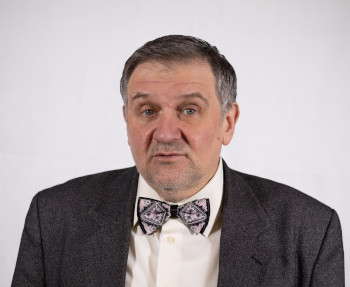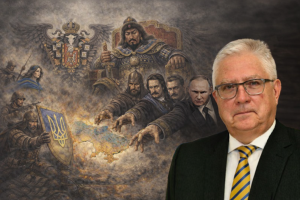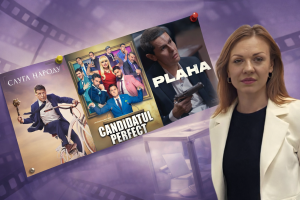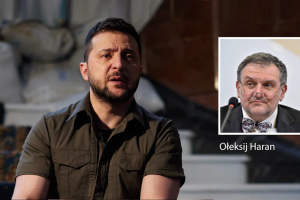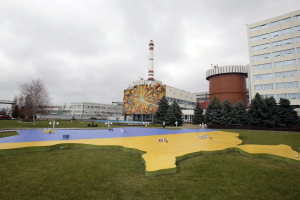We beseech South Africa to form united front with China, India and Brazil to speak truth to Putin
Oleksiy Haran, Scientific Director of the Ilko Kucheriv Democratic Initiatives Foundation and Professor at the National University of Kyiv-Mohyla Academy, visited South Africa this month to meet with political and civil society leaders, as well as to talk to South Africans about support and cooperation to end the war.
In South Africa, he was part of a delegation of Ukrainian civil society leaders aimed at establishing better cooperation between the two countries.
"I want to understand more about how Russia's war against Ukraine has affected South Africa; learn how we can work together to end the conflict; and how our two countries can establish a closer partnership for a brighter future," said Mr. Garan.
In his article for the Daily Maverick, the research director writes that South Africans know all too well what it is to suffer. Decades of colonial occupation, followed by the hell of apartheid, left deep scars on the nation. They survived the enslavement of the oppressor and know that the only way to survive is to fight.
It’s been more than a year since Russia launched a full-scale invasion of my country. Since then, tens of thousands of Ukrainians have been murdered and hundreds of thousands more have become victims of Russian war crimes – kidnap, forced deportation, rape and torture are just some of the horrors inflicted upon us.
Over 16 million Ukrainians have been forced from their homes – the greatest refugee crisis since World War 2.
South Africans know all too well what it is to suffer. Decades of colonial occupation, followed by the hell of apartheid, have left deep scars on the nation. You have experienced the subjugation of an oppressor and know that the only way to survive is to fight.
President Vladimir Putin has made his war aims clear – the total destruction of Ukraine and the eradication of the Ukrainian people. He has repeatedly stated that Ukraine is not a separate country from Russia and the Ukrainian people do not exist.
Russian state media has called for the “de-Ukrainisation” of Ukraine. This is nothing less than genocide. For it is not just Ukrainian lives that Putin seeks to end – he is pursuing the obliteration of our history and culture too – the very essence of our nation. Ukraine faces a stark choice: resist or die.
This is not the first time a Russian leader has sought to destroy Ukraine. From 1932 to 1933, leader of the USSR Joseph Stalin visited a deliberate, human-made famine on Ukraine, killing millions. The Holodomor, as it is known, has since been recognised by countries around the world as a genocide.
In later years, the USSR was a friend to South Africa and many in your country remember with gratitude the support it provided in the fight against apartheid.
It is often forgotten, however, that it was Ukraine (in the form of Ukrainian Soviet Socialist Republic), a founding member of the UN, which joined the UN Special Committee Against Apartheid, and it was Ukraine that co-authored many of the significant international resolutions, including the 1966 resolution to mark 21 March, the anniversary of the infamous Sharpeville massacre, as the International Day for the Elimination of Racial Discrimination.
But what is more important today is that Putin’s Russia is not the USSR remade. The Russian state today serves only as a vehicle to further one man’s lust for power. No internationalist, altruistic ideology underpins modern Russian politics. Putin’s eye is not on the creation of an anti-imperialist, socialist world order, but rather he seeks to rebuild the old Russian Empire, a warped nationalistic vision which cares nothing for left-wing ideals.
To those in South Africa who still yearn for a socialist utopia (and as a child of the Soviet Union, I was reared on such dreams), I say look to the values of socialism and see how well Russia embodies them now.
Firstly, freedom. No one in Russia is free to even speak their mind about the government without fear of arrest. Just using the words “the war in Ukraine” can land you in prison. If Putin succeeds, no one in Ukraine will be free either.
Secondly, justice. What justice is there in a powerful, nuclear-armed country invading its smaller, weaker neighbour? A neighbour that, in 1994, voluntarily gave up its own nuclear arsenal in return for guarantees of its territorial integrity from other nuclear powers, including Russia itself.
Thirdly, solidarity. Socialism demands us to stand in solidarity with the oppressed. As Ukrainians are forced into bunkers daily by Russian air strikes, our women are raped by Russian soldiers and our children ripped from their families and deported to Russia, who do you think are the oppressed? With whom do you stand in solidarity?
Now, it is not for me, nor for any foreigner, to tell South Africa what to do. Your position as a member of the Non-Aligned Movement underlines your commitment and your right to resist the dictats of superpowers.
As Naledi Pandor, South Africa’s Minister of International Relations and Cooperation, said last year, “We have resisted becoming embroiled in the politics of confrontation and aggression that has been advocated by the powerful countries. Instead, we have promoted a peaceful resolution of the conflict through dialogue and negotiation.”
Well, dialogue is where South Africa can help us. We, as Ukrainians, cannot yet have dialogue with Russia. Not while they continue to occupy our land and kill our people.
But South Africa, as a member and indeed the next president of BRICS, has influence with Russia itself and also with other powerful countries that can help pressure Putin to end this war.
We do not expect, or ask, South Africa to send weapons and ammunition, although we need both to stay alive.
Instead, we beseech South Africa to speak the truth to Putin and to speak to China, to India, to Brazil, to form a united front to urge Russia to end this war – something only Putin has the power to do by withdrawing his troops from Ukraine.
For if Russia is not stopped in Ukraine, if Putin is allowed to succeed, then the rest of the world loses, becoming poorer, less free, and more dangerous.
And Africans will feel this more keenly than anyone. Right now, in Mali, in the Central African Republic, in Libya, we see Russian mercenaries from the Wagner Group establishing fiefdoms and slaughtering civilians with impunity.
Across the continent, insidious disinformation peddled by Russia’s agents has started to gnaw away at the social fabric, inciting hate and division and interfering with democratic elections. A victorious Russia will only seek to extend its influence further, its use of force and coercion validated by success.
I have travelled to South Africa this month to meet with political and civil society leaders and talk with South Africans from all walks of life.
I want to understand more about how Russia’s war has affected you; to find out how we might work together to end the conflict; and how our two countries can forge a closer partnership for a brighter future. DM

